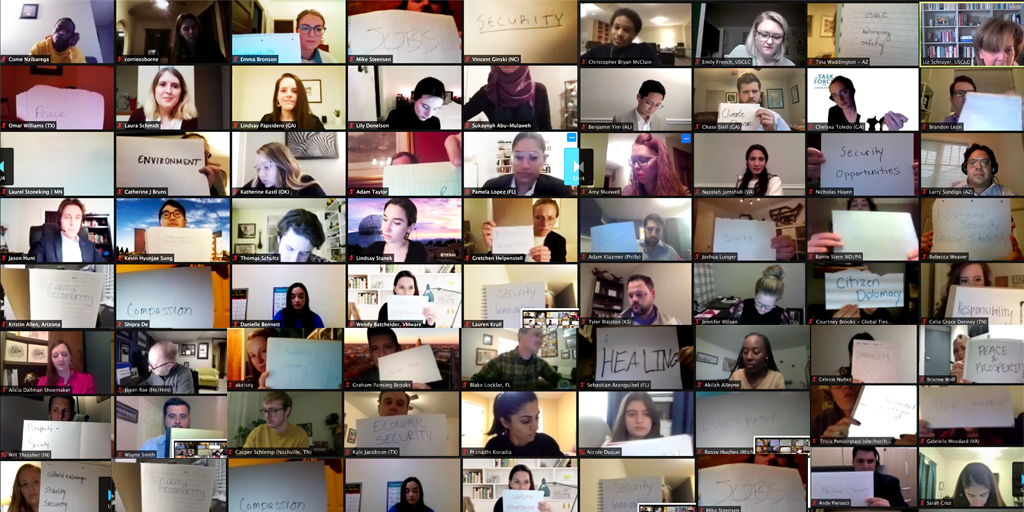
This week’s kick-off session for USGLC’s inaugural class of Next Gen Global Leaders was a proud moment for our organization—and one that’s been years in the making.
In 2019, we first had the idea to launch a program for young professionals that would build into our nationwide network of business, humanitarian, civic, and military leaders. By creating a year-long program focused on leadership, skills training and mentorship, these participants would deepen their capacities to lead and engage their communities on America’s global development and diplomacy. In 2020, we pushed forward with our plans and recruited nearly 100 bipartisan, diverse, and talented young leaders from 33 states to join our inaugural class of Next Gen Global Leaders.
And this week, at the start of 2021, we welcomed them into the USGLC family as they signed into the Zoom classroom for their first session. We broke the ice with talk of, what else, the weather! On this February evening, Nicholas Hayen of St. Paul, MN was experiencing a cool -10 degrees, while Brandon Leon of South Florida and Tina Waddington of Phoenix, AZ both had temperatures in the 70s. USGLC’s President & CEO Liz Schrayer then dove in with an overview of the organization and a “crash course” on America’s diplomacy and global development programs, including the International Affairs Budget—a fundamental part of USGLC’s mission.
And then the class jumped into the heart of the matter—considering the question “Why America’s global leadership matters to ourselves, our families, and our communities?” Our Next Gen Global Leaders wrote their thoughts down and held them up to the Zoom camera and words like Climate, Economic Security, Peace, National Security, Stability, Democracy, and Jobs filled the screen.
One Indiana leader explained why he had written ‘national security’ as “the Gen. Mattis quote, saying he would need more bullets if we didn’t fund these programs overseas…and COVID-19 has impacted our security in a different way, showing these health programs are even more critical.”
Another from Colorado had cited ‘economic prosperity’ on her card, noting that “we can help a developing nation through foreign aid, and they can later become a trading partner with the United States.”
For one Georgia leader it’s all about ‘climate change’, saying “climate change affects everybody, we all know that, and in many regards, China has taken the lead and the U.S. has work to do. We are more than capable of taking the lead.”

During the kick-off session, Next Gen Leaders shared their thoughts on “Why America’s global leadership matters to ourselves, our families, and our communities?”
With the table set on the stakes for America’s global leadership, one of the nation’s most respected diplomats, Ambassador Nicholas Burns joined the class to share an inside look at what it means for America to be a global leader—and the risks of retreating from the world. In his 33 years of diplomatic service, Ambassador Burns has served as U.S. ambassador to both NATO and Greece, undersecretary of State for Political Affairs, and spokesperson for the U.S. Department of State, before moving into his current role as a professor at the Harvard Kennedy School.
Ambassador Burns walked us through the pride of seeing America’s greatness on a global scale throughout his long career, remarking on the incredible achievements of PEPFAR and the millions of lives saved throughout sub-Saharan Africa since the bipartisan initiative started in 2003. In contrast, he also recognized that many in the Next Gen program—whose ages range from 24 to 43—have grown up witnessing huge American crises from 9/11, to decades of endless wars, to extreme partisanship in Congress. He summed it up saying, “We have done great things, and I think your generation can do great things.”
From here, our Next Gen Global Leaders will participate in eight more sessions and have opportunities to turn their knowledge into action throughout the year by meeting with policymakers, writing opinion pieces, and engaging with members of their communities. Once they complete the program at the year’s end, they will become members of USGLC’s State Advisory Committees, where they will continue their advocacy efforts and grow in their careers.
If this week’s session was any indicator of what’s ahead, there’s no doubt these Next Gen leaders will go on to do great things—and help inspire a new generation of America’s global leadership.